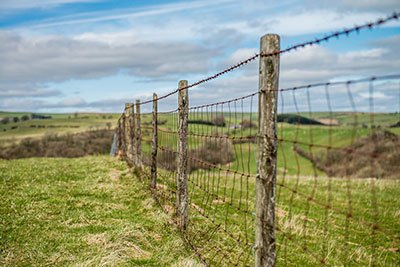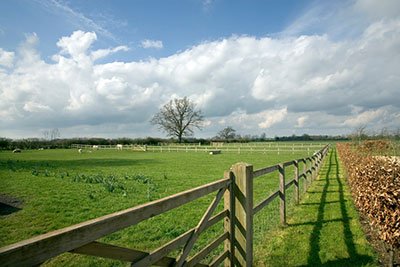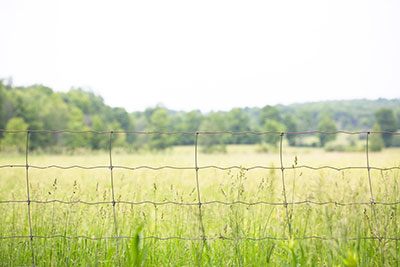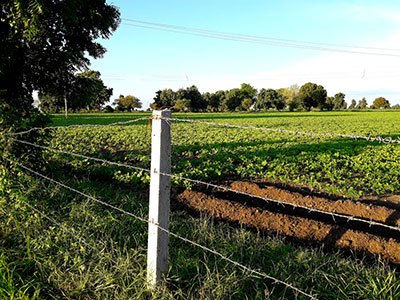Whether you’re a home hobby gardener or a professional-level farmer, farm fencing is one of the most crucial investments for your agricultural operations.
As fences keep larger animals in and predators out, they can be essential for crop protection as well as ensuring animal welfare and safety. With so many options available on the market, however, it can be difficult to decide which type works best for you, particularly when it comes to price.
In this guide, we’ll break down some of today’s top options across the spectrum from least expensive to most costly, helping you understand where different agricultural fence prices fall so that you can make an informed decision about how much money to spend on your own new fence project and get the best deal possible!
Take away key points:
- How much fencing you are going to need depends on several factors, including the type of farm fencing, the size of the area to be enclosed, and labor costs.
- Some of the cheapest farm fencing costs options are barbed wire fence, electric fence wire, paddock fence with wire, and wire mesh with materials costing between $0.03 to $0.15 per foot.
Table of Contents
Average costs of agriculture fencing by type
| Type of fencing | Average cost per linear foot |
| Barbed Wire | $1.50 – $3.00 |
| Woven Wire | $1.50 – $3.50 |
| High-Tensile Wire | $0.75 – $1.59 |
| Electric | $0.15 – $0.25 per sq. ft. |
| Wood | $5 – $10 |
| Vinyl | $25 – $35 per linear foot installed |
| Chain Link | $5 – $20 |
1. Barbed wire fence

The cost of barbed wire fencing varies depending on several factors like material quality, length, height, and installation costs. However, on average, the cost per linear foot of barbed wire fencing ranges from $1.50 to $3.00.
2. Woven wire fence
Woven wire fencing cost also varies depending on the same factors as barbed wire fencing, such as material quality, length, height, and installation cost. On average, the cost per linear foot of woven wire fencing ranges from $1.50 to $3.50.
Woven wire fences come in different gauges, which determine their strength and durability.
Most homeowners like this option as it can be customized to fit the specific needs of agricultural property and provide a practical, long-lasting solution for farming and ranching needs. It’s always best to consult with a professional contractor to choose the right type and size of woven wire fence for your specific use case.
3. High-tensile wire
The cost of high-tensile wire fencing varies depending on factors like material quality, length, height, and installation cost. On average, the cost per linear foot of high-tensile wire fencing ranges from $0.75 to $1.59.
High-tensile wire fencing is a popular option for agricultural fencing because it can be used for a variety of purposes, such as:
– Containing livestock like horses, cattle, and sheep
– Dividing pastures and grazing areas
– Creating a barrier for property and equipment
– Preventing wild animals from accessing crops and fields
4. Electric fence
Electric fences are a cost-effective option for agricultural fencing and are widely used to contain livestock and protect crops. The cost of electric fencing depends on several factors, such as material quality, length, height, energizer power, and field fence installation costs.
On average, the cost of electric livestock fencing is around $0.15 to $0.25 per square foot, making it one of the most affordable farm fencing options. However, since the energizer is an essential component of electric fencing, it’s important to choose a high-quality and durable energizer to ensure the fence’s overall effectiveness.
The total cost of electric fences is a bit high for one acre of land, as well as the labor required to install the agricultural fencing wire. However, electric fencing cost is nothing compared to the security it offers. Most homeowners opt for this type of fencing as protection from intruders or larger animals.
Electric fences use a pulsed electric current to shock trespassing animals or humans, making them an effective deterrent. It is important to remember that electric fences require maintenance to ensure they are functioning properly and to ensure the safety of livestock and humans.
5. Wood fence
Wooden fence posts are a popular option for agricultural fencing because of their natural look and durability. The cost of wood livestock fencing varies depending on several factors like material quality, length, height, and installation costs.
On average, the cost per linear foot of wood post fencing ranges from $5 to $10. However, the cost can increase depending on the type of wood used, such as cedar or redwood, which are more expensive but also more durable and weather-resistant than cheaper woods like pine.

6. Vinyl fence
On average, the cost per linear foot of vinyl fencing ranges from $25 to $35. However, this cost can increase depending on the height and style of the fence. Vinyl fences come in a variety of colors and styles, such as picket, privacy, and ranch split rail, providing options to fit any aesthetic preference.
Vinyl fence is a popular choice for animal containment, as they are difficult to break or chew through, making them a great option for horses, smaller animals cattle, and other large livestock. Additionally, they are easy to clean and do not require regular maintenance, unlike wood board fence.
7. Chain link fence
The cost per linear foot of chain link fencing ranges from $5 to $20. The cost can increase depending on the height and gauge of the fence. Chain link fences also come in different colors and styles, such as vinyl-coated or galvanized steel options.
Chain link fences are a great option for animal containment and can be used to secure large areas such as pastures and fields. They require minimal maintenance and withstand harsh weather ground conditions, making them a popular choice for agricultural properties.
Livestock fences
1. Cost of cattle fencing
To build cattle fencing, the average cost based on material would sum up to:
– Barbed wire fence: $0.03 to $0.05 per foot
– High-tensile non-electric: $0.12 to $0.18 per foot
– Woven wire fence: $0.10 to $0.20 per foot
– High-tensile electric wire: $0.13 to $0.19 per foot
– Pipe: $8 to $10 per foot
– Vinyl: $2 to $5 per foot
2. Horse fencing
Horse fencing prices also depend on the type of material and the cost of installation:
– High-tensile wire: $0.12 to $0.18 per foot
– Electric tape or rope: $0.15 to $0.30 per foot
– PVC plastic/vinyl: $3 to $12 per foot
– Wood: $5 to $10 per foot
– Pipe fencing: $8 to $10 per foot
3. Game fencing
Game farm fencing is a type of agricultural fencing designed to contain animals such as deer, elk, and other wildlife that can potentially cause damage to crops and gardens.
Prices for game fencing can vary depending on the type of fencing and the size of the area to be fenced. Here are some average prices for game fencing options:
– High-tensile wire: $0.12 to $0.18 per foot
– Deer-proof garden fence: $1.35 to $1.70 per foot
– Game fence with 8′ high, 8.5′ high or 10′ high: $6 to $15 per foot
– Chain link game fence: $10 to $16 per foot
– Net fencing: $0.20 to $0.60 per foot
4. Goat fencing

Prices for goat fencing can vary depending on the type of fencing, the size of the area to be fenced, and the number of goats.
Here are some average prices for goat fencing options:
– Woven wire: $0.70 to $1.20 per foot
– Electric netting: $0.30 to $0.70 per foot
– High-tensile wire: $0.10 to $0.35 per foot
– Field fence: $0.50 to $0.80 per foot
– Electric wire: $0.10 to $0.15 per foot
5. Chicken fencing
Chicken fencing is a must-have for any backyard chicken enthusiast. It provides a safe and secure space for your chickens to roam and forage while keeping them protected from predators. Prices for chicken fencing can vary depending on the type of fencing and the size of the area to be fenced.
Here are some average prices for chicken fencing options:
– Poultry netting: $0.25 to $0.50 per foot
– Chicken wire: $0.40 to $0.80 per foot
– High-tensile wire: $0.10 to $0.35 per foot
– Hardware cloth: $0.80 to $1.20 per foot
Where to buy fences for agriculture?
– Home improvement stores: Many home improvement stores carry a variety of fencing options, including those suitable for agricultural use.
– Specialty fencing stores: There are stores that specialize in fencing options, and many of these stores carry a range of options specifically tailored to the needs of agricultural properties. Additionally, you can find tractor-supply fencing materials if you plan to built the fence by yourself and save time on construction.
– Online retailers: There are many online retailers that offer a wide range of fencing options, often at competitive prices and with the convenience of direct delivery to your location.
Cost of farm fencing materials
– Post hole digger for digging holes: $15-$50
– T-post driver: $30-$60
– Wire crimping tool: $15-$30
– Fencing pliers: $25-$50
– Wire stretcher: $30-$50
– Corner braces: $6-$15 each
– Gate hardware (hinges, latches, handles): $10-$30 per item
– Fencing staples: $5-$15 per box
– T-posts: $3-$6 each
– Fence posts: $5-$20 each, depending on height and materials
It’s important to invest in quality agricultural fencing tools and supplies to ensure the durability and longevity of your fencing.
Remember to factor in the cost of these tools and supplies when budgeting for your agriculture fencing project.
Depending on the type of fence you are building, additional tools and supplies may be required. Be sure to consult with a professional contractor to ensure you have everything you need before starting your project.
How to choose the best option (store-bough & online)
1. Consider your needs
What type of animals do you need to contain? What level of protection do you need for your crops? What is the size and shape of your property? Answering these important questions will help you choose the right type of fencing for your specific needs.
2. Determine your budget
Fencing materials can vary greatly in price, so it’s important to determine how much you are willing to spend before making a purchase. Be sure to factor in the cost of installation, maintenance, and potential repairs over time as well.
3. Research different types of fencing
There are many different types of agriculture fencing available, each with their own unique advantages and disadvantages. Some popular options include barbed wire, woven wire, high-tensile wire, electric, wood, vinyl, and chain link fencing. Researching the pros and cons of each type can help you choose the best option for your specific needs.
4. Consider the quality
When choosing a fencing material, it’s important to consider the quality of the product. Low-quality materials may be less expensive initially, but they may cost more in maintenance and repairs over time. It’s always best to purchase high-quality materials that are designed to last.
5. Consult with a professional
Consulting with a professional fence contractor can help you determine the right type of fencing for your needs, provide accurate cost estimates, and ensure proper installation and maintenance of your fence.
When is the best time to purchase an agriculture fence?

The best time to purchase an agriculture fence depends on several factors, such as the type of fence, the area to be fenced, and the time needed for installation.
For example, barbed wire and woven wire fences can be installed anytime during the year as long as the ground is not too frozen or saturated. High-tensile wire fences can be installed during the same periods; however, extra care must be taken because the additional tension placed on the fence posts can affect the soil.
Electric fences can be installed throughout the year but are often better suited during the dry season when the ground is less conductive.
On the other hand, wood and vinyl fences generally require drier conditions for installation. Purchasing during the offseason or winter months can often result in lower prices due to lower demand.
Fencing on a budget: is it possible?
Fencing on a budget is definitely possible! Here are some tips for keeping costs low when installing an agricultural fence:
– Choose a cost-effective material: materials such as barbed wire, woven wire, and high-tensile wire can be more affordable than wood or vinyl fences and offer similar benefits.
– Opt for a simple design: choosing a basic fence design without too many frills or decorations can help keep costs down.
– Install it yourself: while hiring a professional contractor can ensure a quality installation, you can install farm fencing on your one and save money on labor costs and your own materials. However, you need to make sure you are using proper tools if you go for the affordable option.
– Buy in bulk: purchasing materials in bulk can often result in a lower cost per unit than buying small quantities.
– Shop around for the best price: research multiple suppliers or retailers to compare prices and find the best deal.
– Consider used materials: checking for used fencing materials can help you stay within your budget.
FAQs
How much does it cost to fence around 1 acre?
The estimated cost to fence around 1 acre can vary from $800 to $15,000, depending on various factors such as type of fencing, materials, and labor costs
What is the cheapest type of farm fencing?
The cheapest type of farm fencing can vary and ultimately depend on specific project needs. However, some of the lowest-cost fencing options are barbed wire and electric wire, with materials costing between $0.03 to $0.15 per foot.
How much is 300 ft of fencing?
The cost of 300 ft of fencing depends on the type of material used, varying from $90 to $5,400. The final cost will vary based on factors such as installation, labor, and additional supplies needed.
Why is fencing so expensive right now?
Fencing prices have increased due to several factors such as increased material and labor costs, transportation cost, and higher market demand during the pandemic.
Final words
In conclusion, purchasing and installing a farm fence is an important investment in protecting your property and livestock.
The cost of farm fencing installation and materials can vary greatly depending on factors such as the type of fencing, size of the area to be enclosed, and on how to install farm fencing.
Despite recent price increases, making an informed decision and choosing the best fencing options for your needs will be a smart investment in the long run.
